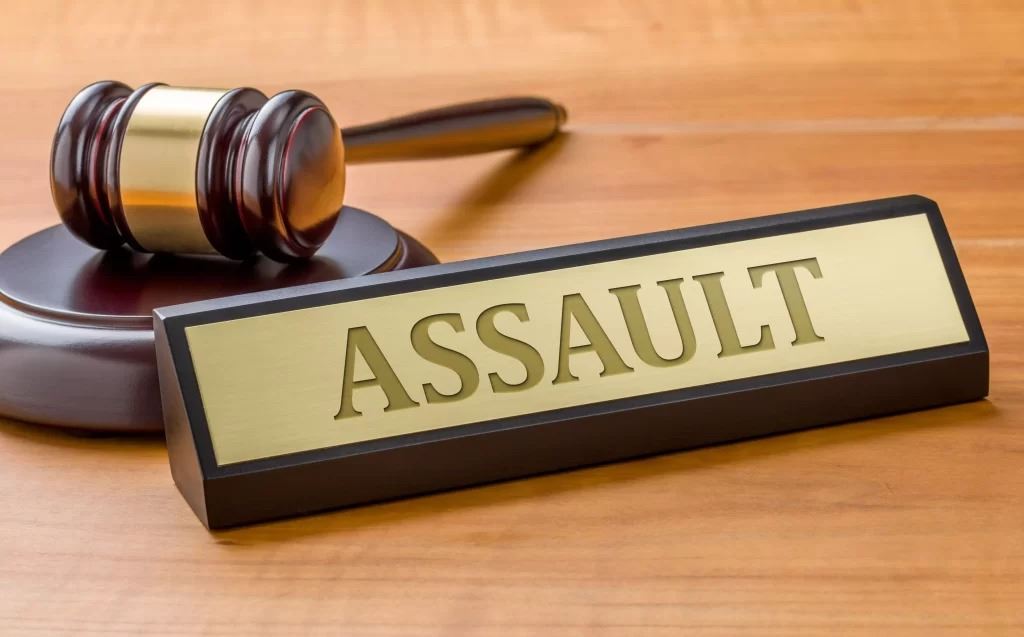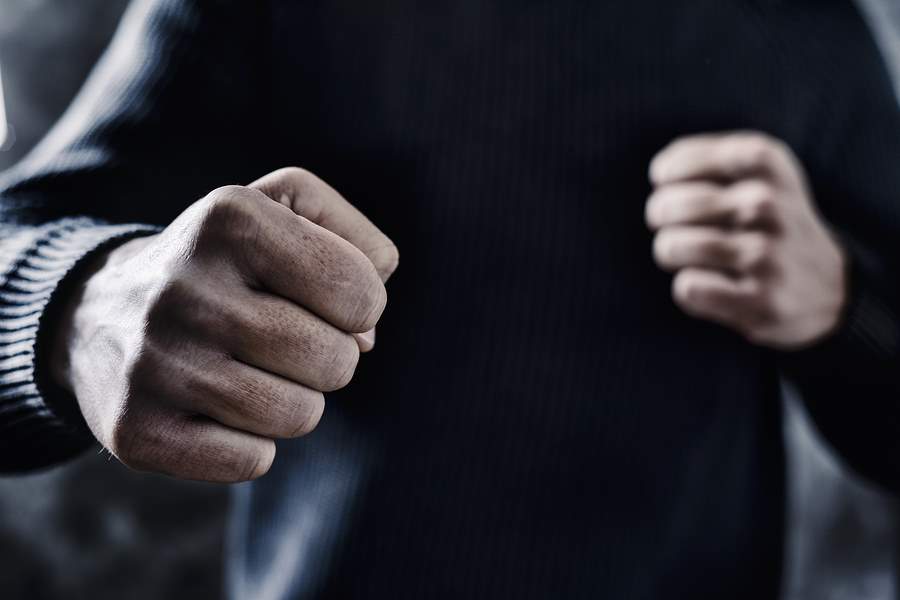In South Carolina you might be able to file a lawsuit against the personal who assaulted you. However, collecting any money you’ve been awarded could be challenging.
For the most part, personal injury claims are filed over accidents such as a car crash or a slip and fall, but sometimes the actions that caused the harm were intentional rather than accidental or unintentional.
“Assault” and “battery,” in the context of personal injury law are intentional torts that can form the basis of a civil lawsuit in court. In the typical courtroom case, the victim of assault and battery sues the offender seeking compensation or injuries and other damages that resulted from the incident that occurred.
In this article, we will define the conduct that amounts to “assault” as well as, what amounts to “battery.” We will explain the differences between criminal and civil cases involving these intentional torts, and offer words of caution and advice in case you decide to bring a civil lawsuit.
What Is Assault in South Carolina?
The tort of “assault” is usually defined as an intentional act that is meant to cause a “reasonable apprehension of imminent and harmful contact” in other words, this is an action that made the victim expect they were about to be hurt or touched in a potentially harmful manner by the offender.
Under South Carolina law, the victim’s apprehension or fear of imminent harm is all that is necessary in order for the act to be considered an assault under personal injury law. A personal injury lawsuit for assault could arise from any of the following situations:
- Assailant threatens physical harm to the victim
- The Assailant uses threats to scare the victim with physical harm
- Assailant uses tactics of intimidation to scare the victim with physical harm
These examples show that no actual contact or touching is required for the intentional tort of assault to take place as it is the threat of physical harm that matters. If, in fact, contact does occur between the assailant and the victim, then the intentional tort of “battery” can become part of the equation. We, at Templeton, Mims, and Ward, can assist you with this understanding this process. Contact us today at (843) 891-6100 or info@tmwlawsc.com to come to our offices for a consultation.
What Is Battery in South Carolina?
Battery in South Carolina results in the unlawful touching of another person without their permission with the likely intent that the touching might cause injury. For battery to occur, the contact by the assailant and the resulting offense to the victim can consist of:
- Direct and immediate contact (ie – hitting the victim)
- Indirect and immediate contact (ie – assailant spitting on or throwing an object at the victim)
- Indirect and remote contact
Take note that the victim does not actually have to be physically harmed in order for battery to take place under civil law. All that is required is that the contact be offensive or inappropriate and that the assailant meant for the offending contact to take place.
The intentional torts of assault and battery can often stem from one event, but that isn’t always, nor does it have to be, the case. It is possible for an assault to occur without battery taking place – i.e. the assailant raising their fist in a threatening manner without actually throwing a punch. Likewise, battery can also take place without one being assaulted. For example, if the assailant pushes the victim from behind, that would most certainly be considered battery under personal injury law. However, if the victim had no knowledge prior of the assailant about to assault them, then it can be seen that the intentional tort of assault possibly did not occur.
What To Do After Being Assaulted In South Carolina?
It is important to protect yourself and your legal rights after any kind of incident that may possibly amount to assault or battery.
Seek Medical Attention:
Your first concern should be your well-being. Once you are in a threat free environment, see proper medical attention for any injuries that may have occurred. If you are experiencing pain, get to an emergency room, or schedule an appointment with your doctor and have yourself checked out. While your health is of the utmost importance, seeking prompt medical care for injuries is also important if you decide to take legal action against the person who assaulted you.
Gather Evidence Of The Incident:
Once you have sought medical attention, the next step is to document the incident. You will want to take photos of any physical injuries, torn clothing, or anything else that might assist in establishing the severity and nature of the assault that has occurred.
Be sure you obtain any photos or video taken of the incidents by any bystanders. Be sure to check for surveillance video of the incident from surrounding houses, buildings, and businesses where the assault occurred. Also, talk to any witnesses that may have seen the incident. Make sure to get names and contact information of anyone who may have seen any aspect of the incident including what led up to it, the attack itself, and the aftermath of the altercation.
Contact Law Enforcement:
It is highly recommended that you contact law enforcement if the incident was of a serious nature. You will need to cooperate with any resulting investigation, hand over any evidence you’ve collected, and give the police the information of any witnesses that may have seen the incident.
Be aware that the members of law enforcement and the local district attorney will decide whether or not the matter moves forward with criminal charges. This means it is not up to you whether the person who committed the assault get arrested or faces criminal charges over the incident.
Assault And Battery Lawsuit In South Carolina
An assault and/or battery civil lawsuit is filed in court by the victim, otherwise known as the plaintiff, against the offender, otherwise known as the defendant. While the nature of what the victim/plaintiff need to prove in a civil lawsuit are unique in these kind of cases, from a procedural standpoint an assault and/or battery lawsuit is very similar to a personal injury lawsuit.
Assault and/or Battery Civil Lawsuits Vs Criminal Cases In South Carolina
As mentioned above, assault and battery cases are crimes that can be prosecuted by the government as well. While the definition of criminal assault and battery varies state to state, these crimes always involve acts of physical violence committed by one person against another with varying degrees of seriousness.
For example, the single act of punching someone during the course of an argument can be both the subject of a criminal prosecution filed by a district attorney and a personal injury lawsuit for damages which would be filed by the plaintiff in civil court.
The plaintiff can win in a civil court judgement where the defendant is ordered to pay a set amount of money as compensation for the harm inflicted. And, depending on the criminal charges the defendant is facing and what they are convicted of, they could face a variety of punishments, such as:
- Fines
- Incarceration in jail or prison
- Probation
- Court ordered counseling
Damages In Assault And Battery Cases In South Carolina
Civil cases involving assault and battery can run a spectrum of seriousness when it comes to injuries. In many states, no actual physical injury is required, so lawsuits for assault and battery can very widely in terms of damages. In cases where there was no actual physical harm done, filing a lawsuit might not be worth the trouble and cost in the long run even though an assault or battery may have technically taken place.
However, when an assault and battery incident causes substantial harm, a personal injury lawsuit against the offender may be worth it, especially if your injuries require extensive medical attention or hospitalization, and if you’ve experienced emotional distress or other kinds of non-physical harm.
The different types of damages that might arise in the wake of assault and battery are:
- The victim’s medical bills and the cost of the future medical care necessary to treat the assault and battery injuries
- Time missed at work, missed business opportunities, and other kinds of lost income resulting from the victim’s inability to make a living
- Physical and mental pain and suffering resulting from the injuries, necessary medical treatment, and the impact of the incident on the victim
Proving You Sustained Assault or Battery Damages In South Carolina
This aspect of a civil lawsuit over assault and battery is determined by:
- The extent and nature of your injuries
- Seeking of medical attention and treatment
- Medical records show that your injuries are consistent with your version of how the incident happened
Your proof of damages, specifically the impact that the assault and/or battery has had on your life, could benefit from a daily written account of how your injuries have affected you physically and mentally.
Defenses In Assault And Battery Lawsuits in South Carolina
A lawsuit for personal injury resulting from assault or battery will not be successful if the person being accused has a valid legal excuse for their conduct. Here are some of the most common defenses to a personal injury lawsuit alleging assault or battery has occurred.
Self-defense or defense of others:
A lawsuit will not be successful if the defendant was responding appropriately to a threat of harm.
Example: If the plaintiff swings at the defendant at the time of the original altercation, the defendant can legally grab the plaintiff’s arm and try to subdue him without being liable for battery as it would be considered a reasonable response and self-defense.
Consent:
A defendant might say that the plaintiff agreed to the possibility of being hurt or injured. This type of defense most often occurs in lawsuits involving sports or similar activities. If a plantiff filed a lawsuit in these types of circumstances may have a difficult time winning the case if they consented to a certain physical contact.
Statute Of Limitations On Filing A Civil Lawsuit For Assault And Battery in South Carolina?
In any kind of civil lawsuit there are time constraints for filing a case in court. This is known as the “statute of limitations” which is currently 3 years in South Carolina for civil actions.
Winning An Assault Or Battery Case In South Carolina Does Not Mean You Will Actually Be Compensated
Theoretically you can “win” an assault and battery case in court, meaning the judge or jury decides in your favor and that the defendant harmed you, and that you should be compensated for your damages, but still end up with little or no money to show for it.
In many types of personal injury cases, liability insurance covers the underlying incident – i.e. slip and fall or car accident, but since insurance policies don’t cover intentional actions, you won’t be able to count on an insurance company stepping in and paying for any judgement you may have won. So instead, you will have to hope that the person who assaulted you has enough in the way of assets to pay for the judgement against them.
Seeking Help From An Experienced South Carolina Law Firm And Attorney After Assault or Battery
If you are harmed by someone’s intentional act of violence, it can be difficult to know all of your options, even more so if you’re still recovering from injuries. At Templeton, Mims, And Ward, we have the knowledge and experience to help you get the best possible outcome for your case and hearings. Our offices are located in Summerville, South Carolina, but we represent clients throughout the Low Country, including Charleston County, Berkeley County, Dorchester County, Calhoun County, Colleton County, Beaufort County, Georgetown County, and Orangeburg County, including communities such as Charleston, Summerville, Daniel Island, Folly Beach, Mount Pleasant, Moncks Corner, Beaufort, Hannahan, Goose Creek, St. George, Walterboro, and North Charleston, SC. Contact us at (843) 891-6100 or info@tmwlawsc.com for your consultation today.




